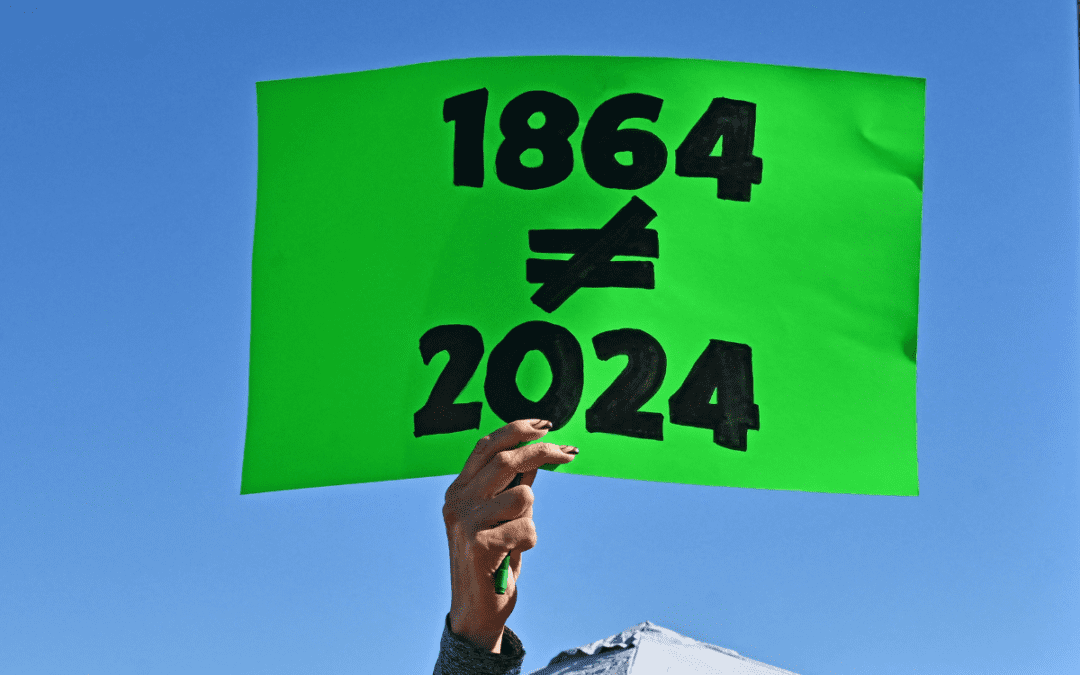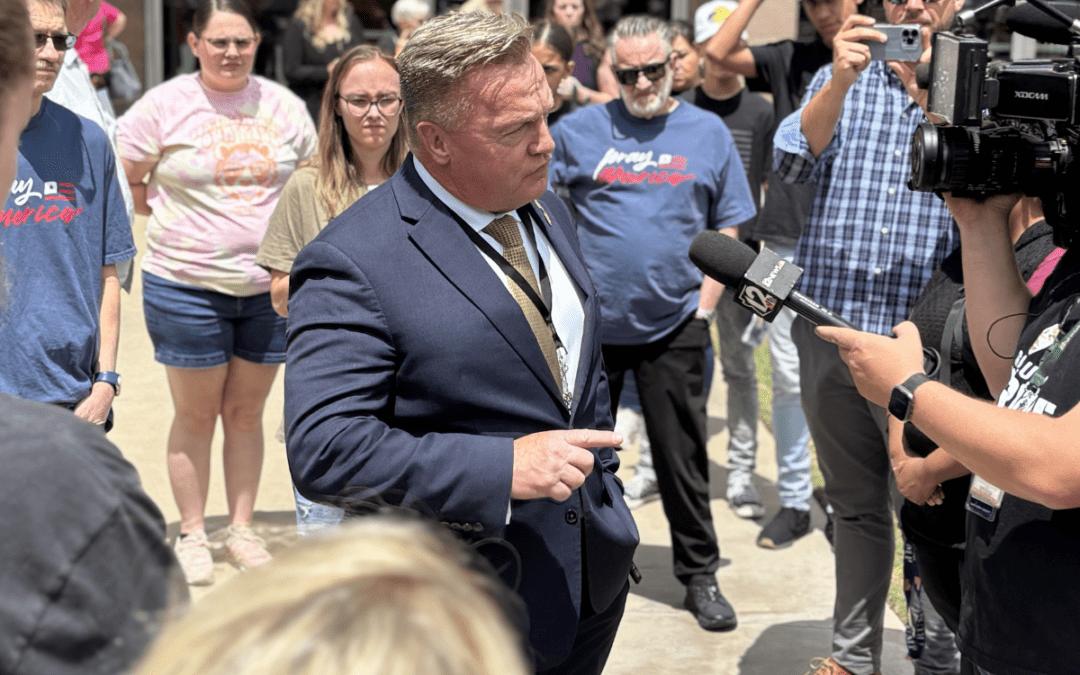
PHOENIX, ARIZONA - OCTOBER 01: Maricopa County constable Darlene Martinez arrives to a home to post an eviction order on October 1, 2020 in Phoenix, Arizona. Thousands of court-ordered evictions continue nationwide despite a Centers for Disease Control (CDC) moratorium for renters impacted by the coronavirus pandemic. Although state and county officials say they have tried to educate the public on the protections, many renters remain unaware and fail to complete the necessary forms to remain in their homes. In many cases landlords have worked out more flexible payment plans with vulnerable tenants, although these temporary solutions have become fraught as the pandemic drags on. With millions of Americans still unemployed due to the pandemic, federal rental assistance proposals remain gridlocked in Congress. The expiry of the CDC moratorium at year's end looms large, as renters and landlord face a potential tsunami of evictions and foreclosures nationwide. (Photo by John Moore/Getty Images)
“They worked out a deal, so he’s staying.”
“Gut-wrenching” is how Darlene Martinez, constable of the Maricopa County Downtown Precinct, describes evictions.
Her job is to serve papers of the court. When serving eviction orders, this can mean changing locks and escorting people out of their homes.
“I really don’t want to put people out in a pandemic,” Martinez told The Copper Courier.

This year, It’s less often that she serves an eviction and people actually need to leave due to state and federal protections put in place to help households impacted by the COVID-19 pandemic.
Most of the time, her job is to be a middleman between tenants and landlords to help work out payment plans that would allow people to catch up on unpaid rent and remain in their homes.
“The constables have always been mediators. We try to help people … We try to help both sides,” Martinez said. “I get that the landlords still got to pay their mortgage, but I also know that the tenants are in a hard place because they’ve lost their jobs, they’ve had health issues.”
Last month, Getty photographer John Moore followed Martinez for a few days, capturing what her job looks like right now.
One of those photos shows Martinez with her hand on a man’s shoulder as he looks at her intently.

“He didn’t know about the resources that were available to him, and he had lost his job,” she said.
The pair are standing next to a car, where the property manager is sitting. Martinez said she explained to the man how to apply for assistance, and he apologized to the property manager for not communicating with her.
“I’ve talked to them since, and he has made some payments,” Martinez said. “They worked out a deal, so he’s staying.”
Other photos show a family living inside an RV.

The man on the couch is Hector Medrano. He was struggling to make payments on the land where he was parked for a myriad of reasons: his income had been sporadic throughout the pandemic, he had to bury three of his family members in just four months, and he had to help his kids with remote schooling.
“Super nice man. And he works at night because that’s the job he needed to get so he could take care of his kids during the day,” Martinez said.
Medrano’s wife, who had temporary residency in the US, went to Mexico in December 2019 to care for her mother, and has been stuck there due to pandemic restrictions on the border.
Martinez said Moore helped Medrano set up a GoFundMe campaign, which has helped the family bring in nearly $5,000.
“He’s doing great,” Martinez said. “His rent’s all caught up.”
Communication difficulties
Martinez said getting tenants the information they need to know has been tough as protections and their criteria change. Many people are under the impression that no evictions are happening, she said, but that’s only true if the rules are being followed.
“That’s the biggest problem here, is the misinformation, because when everything came out initially, everybody thought … that there was no evictions,” she said. “Well, that wasn’t true.”

In order to be eligible for the US Centers for Disease Control and Prevention (CDC) protection, tenants must show they’ve applied for rental assistance and provide their landlord with a copy of the CDC declaration.
Some evictions are still happening for other reasons, like if a person’s nonpayment is not related to rent, or if a person violated the rules of their lease.
“There still are guidelines that still do not stop the eviction,” Martinez said. “In other words, if you’re doing things—like you’re shooting your gun off in the apartment complex, if you’re putting yourself or others at risk in the apartments—that would supersede … the CDC.”
A valuable job
Martinez, who won her first election in 2018 and took office the following year, said the ability to help people makes her job worth doing.
“I think all the constables have been making a great effort to try to help everybody in this pandemic,” she said, “because this job is hard enough as it is to do what we do.”
Martinez said she contacts property managers in advance to ask what potential solutions she can offer when serving an order. Then, if it’s her first time at a property and it’s a COVID-related issue, she tells tenants she’s there to help and folds up the eviction paper to put it out of their minds. If both parties are there, she helps broker a deal.

“I right away tell them that, ‘It’s all right, it’s going to be OK. We just need to figure out how we can help you,’” and they usually calm down,” she said.
Martinez said she’s aware that it’s not easy for many people right now to understand and follow all of the CDC requirements while dealing with depression, hunger, fear, and other effects of the pandemic.
“I’m very proud to say what I do,” she said. “I try to treat everyone with dignity and respect.”
Relief running out
While the CDC order is keeping many people in their homes for now, that may not last much longer. It’s set to expire at the end of the year.
Earlier this year, Congress approved $600 additional weekly unemployment payments for people who were laid off, and then after that expired, there were a few weeks when people received $300.

But since early September, Arizonans have only been given the state’s regular maximum payment of $240 per week. At less than $1,000 per month, that’s sometimes not enough to even cover a person’s rent, much less utilities, food, and other bills.
Community advocates have said they are worried about what will happen come January if additional aid isn’t approved. And it looks there are no plans for another stimulus bill in sight—Congress is on Thanksgiving recess as 12 million Americans are expected to lose their unemployment payments by Dec. 26.
Continue Reading: 799 Eviction Hearings Are Scheduled in Maricopa County the Week of Thanksgiving
Politics

Democrats successfully force vote on repealing 1864 abortion ban, passes House
The Arizona legislature moved forward two bills Wednesday that would repeal the state’s 1864 abortion ban. A bill to repeal the ban has been...

State Official: 1864 abortion ban gives Arizona ‘black eye’
Arizona’s role at the forefront of the climate crisis, defending democratic elections, and protecting reproductive rights has caught the attention...
Local News

Arizona Sens. Anthony Kern, Jake Hoffman, indicted for fake election scheme
Eighteen individuals involved in a conspiracy to overturn Arizona’s election results in 2020 were indicted by a grand jury Wednesday and charged...

Gov. Gavin Newsom wants to let Arizona doctors provide abortions in California
California law generally allows abortion up to the point of fetal viability, which is around 24 weeks. SACRAMENTO, Calif. (AP) — Arizona doctors...





